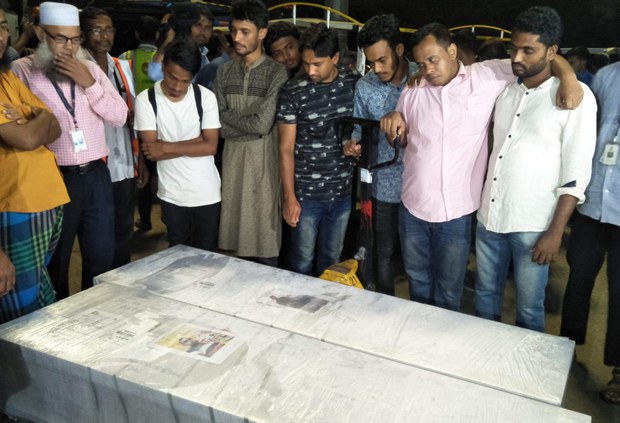Bangladesh: Reported Suicide Rate of Expatriate Domestic Workers Climbs
2019.07.19
Dhaka
 Bangladeshi families receive the bodies of migrant workers who died overseas, at Shahjalal International Airport in Dhaka. Feb. 19, 2019.
Bangladeshi families receive the bodies of migrant workers who died overseas, at Shahjalal International Airport in Dhaka. Feb. 19, 2019.
The number of suicide deaths among Bangladeshi women employed as domestic workers in the Middle East has been rising but not at an alarming rate, according to the government.
One female worker committed suicide in 2016, but the number rose to 12 the following year and to 23 in 2018, officials with the Expatriate Welfare Ministry (EWM) said. And through the end of June this year, 17 suicides have already been reported, they said.
“We have no information of a possible alarming increase in suicides. We did not make any study of it, we just have a list of deaths of expatriates and the return of their bodies,” Ahmed Munirus Salehin, an additional secretary at the ministry, told BenarNews.
But the largest NGO in Bangladesh says it is alarmed by the suicide rate among the large numbers of female migrants who leave the South Asian nation to work in Saudi Arabia and elsewhere in the Mid-East.
The organization known as the Bangladesh Rural Advancement Committee is calling on the government to find out why 53 women have taken their own lives during the past three and a half years while working as domestics in that region.
“The number of suicides is certainly alarming. Unnatural death of even a single person is a matter of concern,” said Shariful Hasan, head of the migration program at BRAC.
“Why are they committing suicide? The reasons must be investigated. Certainly they are facing situations that led them to take their own lives,” he told BenarNews.
He suggested that post-mortems be done on bodies of expatriate workers, which have been returned to Bangladesh from Saudi Arabia and other countries, to confirm cause of death.
Families seek autopsies
The family of Samsun Nahar and others in Bangladesh would welcome such examinations of their deceased loved ones.
After her husband died Samsun Nahar left Bangladesh last year for a job in Saudi Arabia as a domestic aide. She left behind her son in the hopes of creating a better life – one that ended with her suicide in the kingdom in February, according to the EWM.
Her 20-year-old son, Ekramul Molla, believes that she and the other women did not take their own lives.
“These are murders. I don’t believe my mother could commit suicide,” he said.
BenarNews talked to the families of 10 victims and most do not believe that they killed themselves.
“Stories of suicide are being made after killing, which could not be proved in any court. The bodies are buried in Bangladesh without post-mortem,” said Shamim Mia, whose sister, Johura Begum, 32, died in Saudi Arabia.
Begum, whose husband had died a few years earlier, left Bangladesh and her 11-year son in February 2018. Three months later, her family in Bangladesh learned of her death.
“We could not bring home her body even after nine months. I went to the officials of the Expatriate Welfare Ministry seeking justice for the death of my sister,” Mia told BenarNews adding, “Nobody helped me.”
“Johura wanted to return home, because she was diagnosed with a tonsil problem in Saudi Arabia. But the owner of the house did not allow her to return. I heard her [have an] altercation with the owner while talking over phone,” Mia said.
Nahar’s son said that she told him she was having problems in Saudi Arabia.
“She might feel shy to elaborate, as I am her son. She could remit only three months’ salary though she worked there for a year and they did not allow her to phone me,” Molla told BenarNews.
Hundreds die overseas
Nazrul Islam, deputy chief of the Bangladesh Mission in Saudi Arabia, said the bodies were returned to Bangladesh after autopsies in Saudi Arabia.
“The Saudi police and forensics department jointly make reports on such deaths,” he told BenarNews.
“Some of the women might commit suicide after becoming homesick. Some may be unable to adapt to the foreign environment,” he said, stressing the need to send skilled workers abroad to avoid such tragedies.
Nazrul Islam did say that some domestic workers might endure physical torture in Saudi Arabia.
“But now the Saudi administration is taking action against rowdy house owners. They have punished some owners after receiving such allegations,” he said.
Since 2016, the bodies of 331 women – all between 25 and 40 years old – have been returned to Bangladesh from Saudi Arabia and elsewhere. In 120 cases, the cause of death is listed as stroke.
At least 62,000 women traveled to Saudi Arabia, Jordan, Lebanon, Oman and the United Arab Emirates in the first six months of 2019. In 2018, Bangladesh sent 101,695 women workers to the Middle East countries and 121,925 in 2017, according to EWM figures.
Money sent home by expatriate workers is a major contributor to the Bangladesh economy, according to government figures. Remittances totaled U.S. $15.5 billion (1.3 trillion taka) in fiscal year 2018, according to the World Bank.







